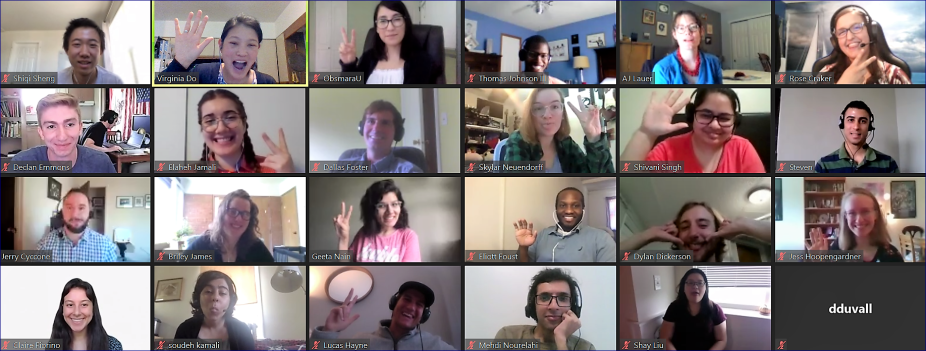2020 SIParCS student internships went virtual
Update: The 2020 SIParCS final presentations are online here.
Imagine you’ve spent months lining up 27 mentors and 14 interns to work together during the summer and something big comes up. Maybe a pandemic disrupts your internship program along with nearly everything else. What do you do?
Along with other internship, workshop, and event managers and planners around the world, the CISL Outreach, Diversity, and Education (CODE) team decided in mid-April to go virtual with SIParCS – the Summer Internships in Parallel Computational Science program.
Going online
“Moving it all online was a pretty big lift,” said AJ Lauer, CODE team lead and SIParCS program director. Instead of traveling from places like Idaho, Oregon, Wyoming, and Puerto Rico to spend several weeks in Boulder, the interns “arrived” on each other’s computer screens on Monday, May 18.

SIParCS interns and CODE staff got together online May 18 for orientation to start the 2020 summer internship program.
Leading up to the start of SIParCS, one of the biggest parts of the “lift” was working with NCAR Education & Outreach to reorganize and reschedule a number of professional development activities that are key elements of the program. A leadership workshop that would have involved an eight-hour day of interaction, for example, was broken up. “We certainly weren’t going to keep them on Zoom for eight straight hours,” Lauer said, “so we had to figure out the best way to do that.”
Lauer noted some other adjustments that had to be made following the decision in mid-April to go virtual. The SIParCS program, as in previous years, had planned to provide housing for the graduate and undergraduate students who come to Boulder for their paid internships, and CISL would provide computers and related tools for them to use. In the new situation, interns have varied work environments and living arrangements and are not as sure of getting other support they might need to be successful in a high-performance computing internship.
To address some of those issues, CODE staff worked with UCAR Human Resources staff to ensure that the students have funding to help with housing costs and internet service expenses they wouldn’t incur if they were able to be in Boulder. CODE also arranged for CISL staff to set up laptops – preloaded with all the software each intern would need for working on their individual projects – and ship them out along with headsets. “We owe a huge thanks to the team that did that for us,” Lauer said.
Being creative
The need to change to a virtual program presented some additional complications. One student decided not to participate and another accepted the position that opened up. A project that involved work at the NCAR-Wyoming Supercomputing Center (NWSC) in Cheyenne had to be modified when access to the facility became restricted to essential employees. Since the intern involved has to remain in Puerto Rico, he will support another project by helping deploy IoT-connected, 3D weather stations there and also participate in the original project remotely.
“The mentors created a hybrid project for him, where he’ll work with data from NWSC and from those weather stations,” Lauer said. She thanked the SIParCS mentors for being creative and flexible in adapting to the new situation to ensure that students have a good experience. The move to a virtual program also meant the mentors received additional training to help them prepare to do their mentoring long-distance.
Lauer added that the internship community has pulled together to create and share resources to prepare students and mentors for remote programs. She pointed to the UCAR Center for Science Education and the GEO REU Resource Center as examples. “Internship managers have been very active in supporting one another through this transition, she said.